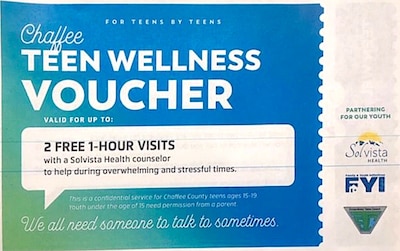School shootings seemed to be forever in the headlines. There was only one counselor at the high school. And there were whispers about a student who had a panic attack in a school bathroom.
That’s what got a group of Colorado high school students in rural Chaffee County talking about teen stress two years ago — and gave them the idea to create a voucher that provides teens with free, confidential counseling.
Today, the “teen wellness vouchers” are available in the county seat of Salida and the town of Buena Vista to the north. They can be found in the county’s high schools, the post office, the library, the Boys & Girls Club, and Fun Street Family Arcade.
In a state with an alarming youth suicide rate and a persistent hunger for prevention strategies, the vouchers represent a student-driven effort to broaden access to mental health services. The idea behind the ubiquitous blue and green paper slips is to simplify the process of seeking help and whittle away the stigma that surrounds mental health.
The professionally designed vouchers, spearheaded by a group called the Extraordinary Teen Council, lead with catchphrase “for teens by teens” and conclude with the tagline, “We all need someone to talk to sometimes.” They entitle users to two free, one-hour counseling sessions with staff from Solvista Health, a local mental health center. In addition to dispensing with the usual slew of paperwork during the first two sessions, counselors can meet students at community locations if teens prefer.
Over the last year, 37 teens have used the vouchers. Originally, they were available to students 15 and up, but now are available to students 12 and up because of a recent state law lowering the age at which minors can receive outpatient psychotherapy without parental consent.

“I feel like everywhere should have this,” said Bella Kintgen, a junior at the 380-student Salida High School and a member of the teen council.
Mandy Kaisner, chief operations officer at Solvista Health, said when the teen council pitched the voucher idea to her, she didn’t hesitate.
“We were so excited about it, we just said yes and made it happen,” she said. “Who doesn’t get excited when youth are driving the boat?”
While many teens who use the vouchers don’t enroll in ongoing treatment, some do. Overall, Solvista’s caseload of patients 18 or younger has increased 26% — from 194 to 245 — since the vouchers were introduced.
Students and high school staff say teenagers have plenty to stress about, including schoolwork, jobs, college admissions, and peer pressure.
“There’s a lot of judgment from other kids at school. Nobody wants to be ‘that kid,’” said Daemon Kerrigan, a junior at Salida High School and a member of the teen council.
“That kid,” said Kintgen, could be the one who’s socially awkward, doesn’t adhere to fashion trends, or likes anime.
Kerrigan and Kintgen said they experienced the spotlight of peer derision at an assembly where members of the teen council were recognized for their efforts to help get vaping banned in local parks. As they stood up, many of their classmates booed.
Kintgen said she sees a lot dark humor about suicide at school.
Classmates press an index finger to their temple as if it’s a gun or say things like, “Oh, you’re not going to see me tomorrow, I’m going to cut my wrists.”
Sometimes, it’s hard to tell who’s kidding and who’s not.
There hasn’t been a suicide at the high school during her time there, Kintgen said. Then she added, “knock on wood.”
Kerrigan said when he gives presentations about the teen wellness vouchers to high school classes, one of the most common questions is, “How anonymous is it? What do you need to give them?”
It’s confidential, he’ll respond. “No one gets told about this.”
Solvista officials said they do involve parents if there is a crisis that could affect student safety.
Rob Tressler, now one of two counselors at Salida High School, said he tells students about the voucher program during one-on-one meetings early in the school year. And while he invites them to talk on the spot if they retrieve a voucher from the counseling office later on, he doesn’t push it.
“We honor that if they don’t necessarily want to talk to me or the other counselor, they’re at least getting help from someone,” he said.

